Church Call to Welcome the Stranger
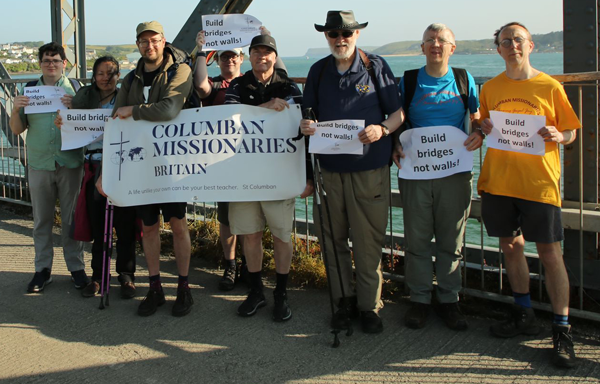
Columbans support 'Build bridges not walls'
Catholic Social Teaching
Catholic Social Teaching views refugees through the principles of human dignity and the common good, emphasizing the inherent worth of every person regardless of status, while also recognizing a state's right to control borders. It calls for nations to welcome, protect, promote, and integrate refugees, supporting policies that uphold their human rights and promote their well-being, especially in times of conflict, poverty, or persecution. There is an imperative from scripture.
"You shall also love the stranger, for you were strangers in the land of Egypt."
Deuteronomy 10:19
"When a stranger sojourns with you in your land, you shall not do him wrong. 34 You shall treat the stranger who sojourns with you as the native among you, and you shall love him as yourself, for you were strangers in the land of Egypt: I am the Lord your God."
Leviticus 19:33-34
"I was hungry and you gave me food, I was thirsty and you gave me drink, I was a stranger and you welcomed me."
Matthew 25:35
"Truly I say to you, as you did it to one of the least of my brethren you did it to me."
Matthew 25:40
"Let mutual love continue. Do not neglect to show hospitality to strangers, for by doing that some have entertained angels without knowing it."
Hebrews 13:1
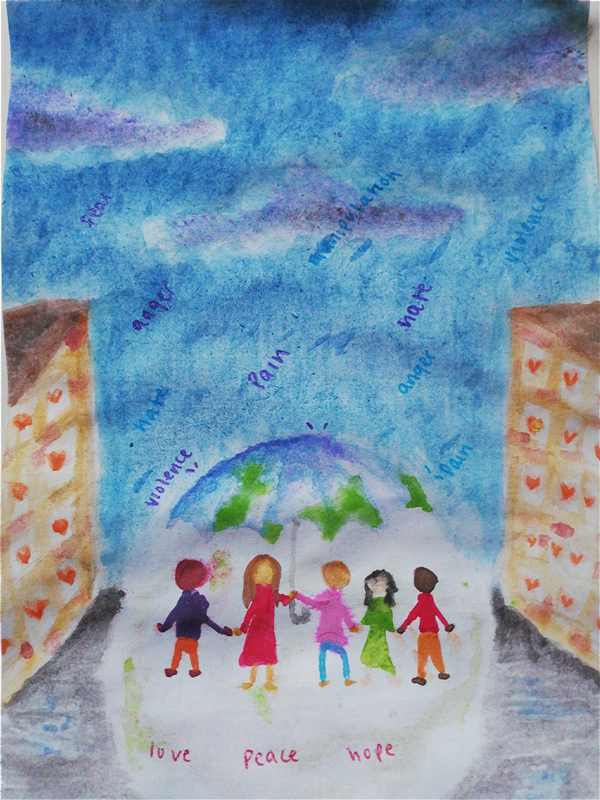
A winner in the Columban 2021 "End Racism" competition
Key Principles and Concepts
Human Dignity: At its core, Catholic teaching affirms that every person, including refugees, possesses inherent human dignity as a child of God. This dignity must be respected, regardless of legal status or origin.
The Common Good: While acknowledging the right of sovereign states to manage their borders, the common good requires nations to act in ways that respect human rights and promote the well-being of all.
Right to Migrate: Catholic teaching recognizes the fundamental right to migrate, particularly when driven by factors like poverty, persecution, or conflict, to seek safety and a livelihood.
Right to Stay: Alongside the right to migrate, there is also a recognition of a person's right to remain in their community, and efforts should be made to alleviate the crises that cause forced displacement.
"Migrants are our brothers and sisters in search of a better life, far away from poverty, hunger, exploitation and the unjust distribution of the planet's resources which are meant to be equitably shared by all. Don't we all want a better, more decent and prosperous life to share with our loved ones?"
Message of Pope Francis for the World Day of Migrants and Refugees, 2016
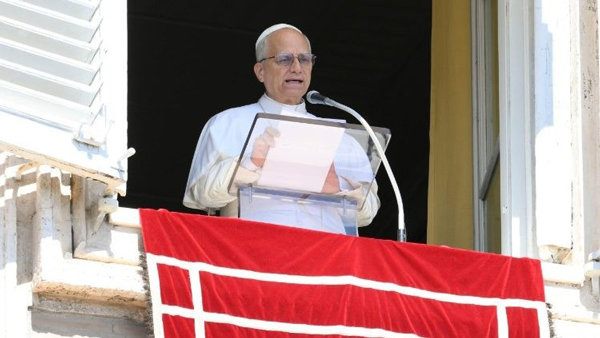
Pope Leo (Vatican News)
"In a world darkened by war and injustice, even when all seems lost, migrants and refugees stand as messengers of hope. Their courage and tenacity bear heroic testimony to a faith that sees beyond what our eyes can see and gives them the strength to defy death on the various contemporary migration routes….. At the same time, the communities that welcome them can also be a living witness to hope, one that is understood as the promise of a present and a future where the dignity of all as children of God is recognized. In this way, migrants and refugees are recognized as brothers and sisters, part of a family in which they can express their talents and participate fully in community life."
Message of Pope Leo XlV for the World Day of Migrants and Refugees, 2025
Pope Leo XIV called for solidarity with "our migrant brothers and sisters" as he addressed tens of thousands of pilgrims who had gathered in Rome for the Jubilees of Migrants and Missions in his homily in St Peter's Square on Sunday 5 October 2025.
Pope Leo’s teaching in 'I have loved you'
The Apostolic Exhortation Dilexi te 'I have loved you' (Rev 3:9), focused on love for the poor, was signed by Pope Leo XIV on 4 October 2025, the feast of St. Francis of Assisi. He said, "I share the desire of my beloved predecessor that all Christians come to appreciate the close connection between Christ's love and his summons to care for the poor."
Britain
A decade of sanctuary
Born from Pope Francis' call to welcome the stranger, Fatima House in Birmingham has spent nearly a decade offering sanctuary, dignity and hope to vulnerable women seeking refuge in Britain. He had called for "every parish, every religious community, every monastery, every sanctuary" has an obligation "to be neighbours to the smallest and most abandoned."
Columban Missionaries, together with the Archdiocese of Birmingham, and Father Hudson's Caritas run the project. It welcomes vulnerable women in need of protection in Birmingham. The project has welcomed nearly 60 women over the last 9 years. Many of the women are at what may be the lowest point in their lives, facing destitution. Some have arrived with their shattered lives crammed into a few bags; clothes, pots, and crockery all packed together, while others have come with nothing more than a single carrier bag. Some come with photographs of their loved ones, while others dream of the day they'll learn of their loved ones' whereabouts. At Fatima House, women are offered sanctuary to enable them to rebuild their lives.
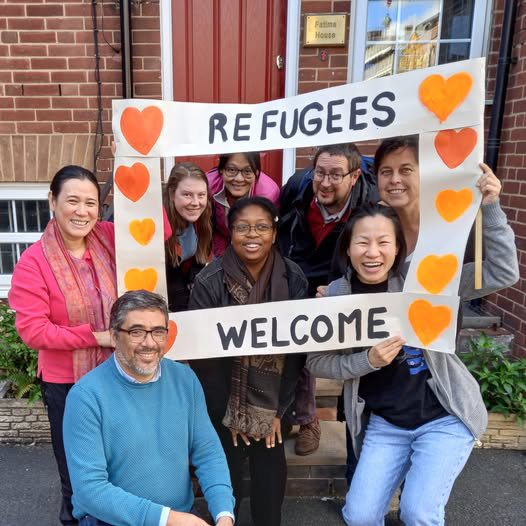
Fatima House in Birmingham
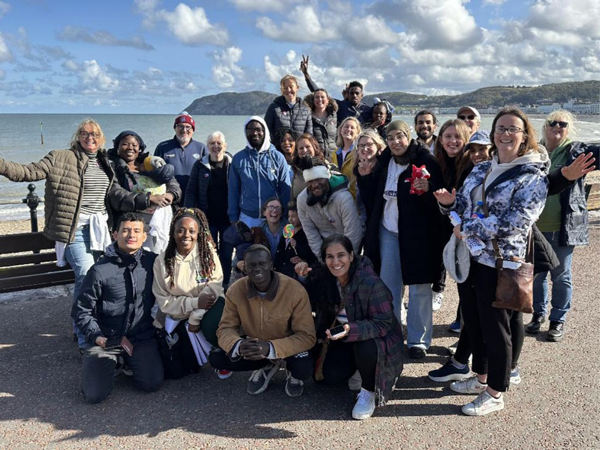
An 'Encounter' gathering
Encounter opportunities for Catholic headteachers
In Britain, Columban co-worker James Trewby works with schools to nurture 'welcoming the stranger'. He has led 'encounter' gatherings for Catholic headteachers and asylum seekers where a transformative residential experience has included asylum seekers sharing their individual stories of hardship, resilience, and hope. Then follow-up visits to schools have provided staff and pupils with valuable insights into the experiences of asylum seekers, fostering empathy, awareness, and a sense of global responsibility among young learners.
Monthly Vigil for migrants at the Home Office
In October 2025 it will be four years since Christian groups, including the Columbans, have held a monthly vigil at the Home Office in London for people who have died trying to reach the UK and for the UK to be a more welcoming nation. The names of people who have died trying to seek sanctuary are read out.
The one-hour vigils are co-sponsored by Westminster Justice and Peace Commission, London Catholic Worker and London Churches Refugee Fund. https://columbans.co.uk/justice-peace/16527/refugee-week-inspiring-welcome-and-love/
Ireland
Dublin City Interfaith Forum
The Columbans in Ireland are members of the Dublin City Interfaith Forum (DCIF), a network seeking to raise awareness of the diversity of faith in the city of Dublin and to build a more inclusive and tolerant society.
The DCIF organises annual events on World Refugee Day (June 20th) to commemorate the lives of refugees and asylum seekers, raise awareness about their plight, and provide a platform for interfaith groups to share experiences and work together.
In response to incidents of hate and intimidation against refugees, the DCIF has publicly condemned such acts and called for practical measures to show support and solidarity with minority communities.
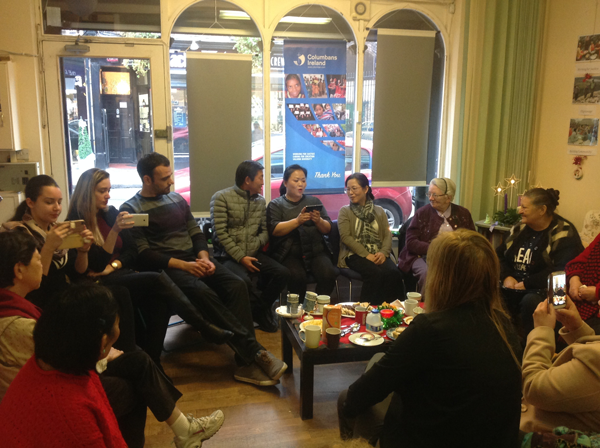
Migrants meeting at a Columban Centre in Dublin
Advocacy for Integration: The forum advocates for a society that welcomes refugees with love and compassion, emphasizing the need for adequate access to housing, education, and employment to ensure their successful integration and participation in society.
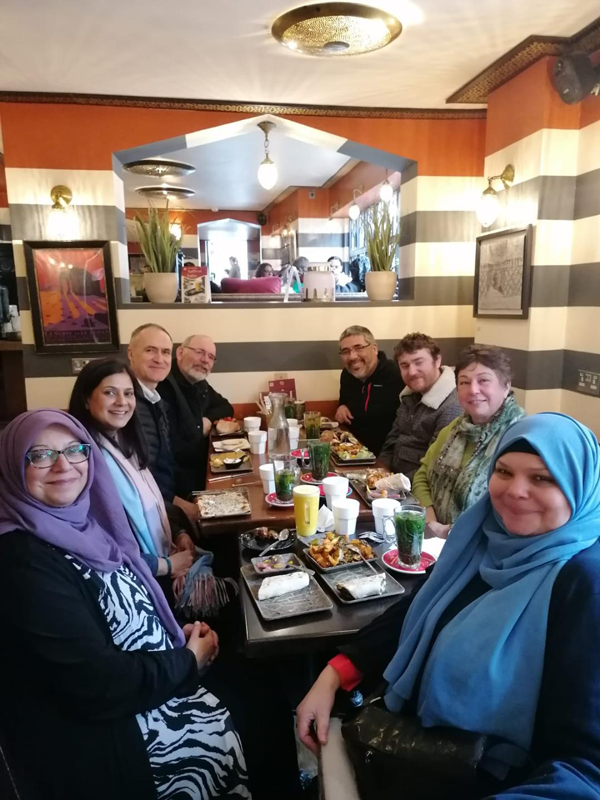
Building community over a meal
Marking UN World Refugee Day
Columbans marked UN World Refugee Day at its Navan centre in June 2025. Each year on 20th June, the world honours the strength and courage of people who have been forced to flee their home country to escape conflict or persecution. In Navan, the keynote event was organised by Cultúr Migrant Centre. The 2025 theme: 'Solidarity with Refugees' reminded that refugees seek not charity, but opportunity; a chance to rebuild their lives, contribute to their communities, and live with dignity. Brian Horan, Senior Executive Officer with Meath County Council and Inspector Alan Roughneen of the Gardaí, reminded that welcoming refugees strengthens societies, fosters innovation, and builds communities where everyone belongs.
Building peaceful communities in our cities
In September 2024, a group of 16 people from Birmingham who are involved in interfaith initiatives, visited Dublin for a three-day visit, hosted by Dublin Interfaith Forum and Columban Missionaries in Ireland. They attended the 'Building Peaceful and Resilient communities in our Cities' at Mansion House in Dublin.
Columban Work With Refugees Around the World
Chile
Over 100 migrants were offered short-term accommodation in the two Columban Migrant Houses in Santiago in 2023. The great majority of migrant residents came from Venezuela, which has been in political, economic and social collapse for several years. The house also took in large numbers of Colombians and Haitians as well as smaller numbers of Ecuadorans, Peruvians, Brazilians, Argentinians, Dominicans, Mexicans, Costa Ricans, as well as two Russians, one Moroccan and one Austrian. https://columbans.co.uk/mission/16541/shared-life-across-cultures/
Australia
Heeding the call of Pope Francis in 2015, Columbans in Melbourne, Australia, opened their home to welcome refugees and asylum seekers and offer a safe and dignified home as they established life in their new country. Having fled countries of extreme violence and poverty, the men, women, and families who stay at the Columban residence find a place where they can begin their journey of healing and hope. In addition to this pastoral care, Columbans partner with local organizations and churches to provide the legal, health, education, and employment services needed when integrating into a new society.
Taiwan
The Hope Workers Center, the Migrants and Immigrants Chaplain Office of Hsinchu Diocese and the Vietnamese Migrant Workers and Immigrants Office were all founded and staffed by Columban missionaries for more than 30 years. Significant legal, social, and pastoral milestones in supporting migrants have been achieved through advocacy, social services, and collaboration with the local church and agencies. Many of the migrants come from majority Muslim and Buddhist countries. Columbans take particular care to respect religious differences while at the same time create space for migrants to socialize and pray together regardless of their particular affiliation.
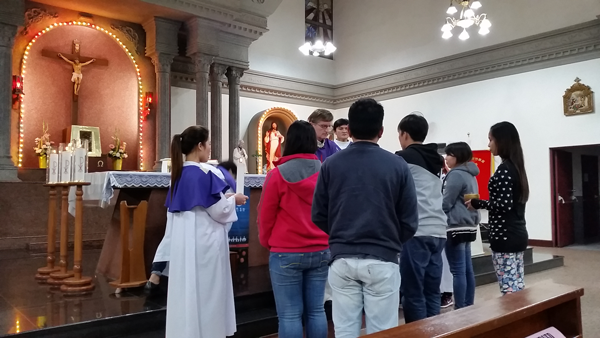
Mass with migrants in Taiwan
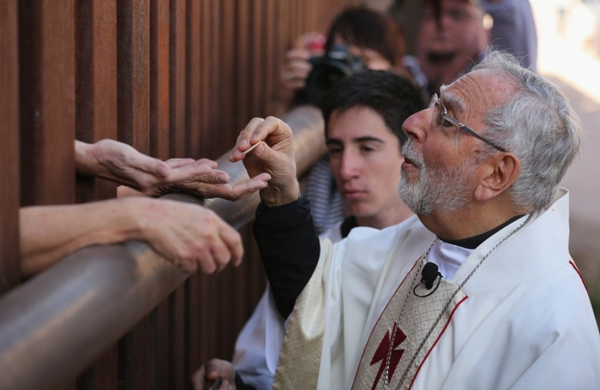
US-Mexico border Eucharist at the wall
United States
For more than 30 years Columbans have lived and worked on the US-Mexico border. Artificially divided by a wall too high to scale and hundreds of miles long, Columbans find themselves providing pastoral care and social services on both sides of the border. In Mexico, Columbans welcome economic migrants and asylum seekers largely from Central and South America though increasingly from Africa, Asia, and even Eastern Europe. Most migrants find themselves in limbo unable to enter the U.S. and unable to settle in Mexico. For those migrants who are able to cross the border, they find hospitality at a Columban center and partnering organizations where they can find some assistance before traveling on to other parts of the country.
Myanmar
Among the various categories of people on the move, one that gets little attention is Internally Displaced Persons (IDPs), refugees in their own land. For decades Myanmar has been fraught with civil war, poverty, and religious discrimination which has led to thousands of people being pushed off their land to try and find safety. Where Columbans live and work, IDP camps can be found that were established decades ago. In these camps, countless children are born and raised and continue their adult lives in the same camps. With little infrastructure, people have no sense of stability or access to essential human rights like health care, education, and meaningful work. Columbans along with partner organizations and the local diocese provide programs and services to fill the gaps and try to meet people's needs.
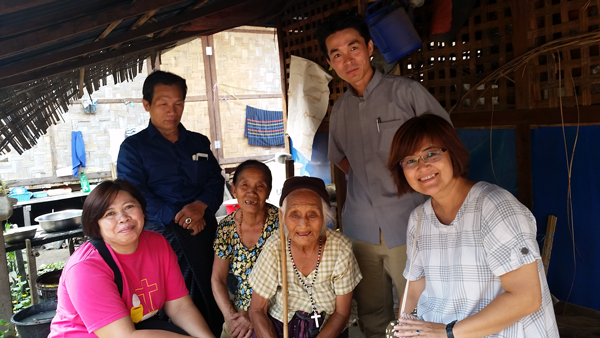
Displaced people in Myanmar
